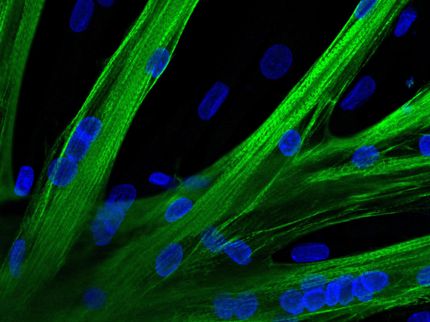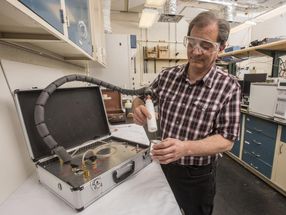Missing Protein Restored in Patients with Muscular Dystrophy
Advances in the treatment of muscular dystrophy: For the first time, a research team has succeeded in restoring a missing repair protein in skeletal muscle of patients with muscular dystrophy. Researchers from the University and the University Hospital of Basel, Department of Biomedicine and Clinic of Neurology, report their recent findings in the scientific journal Science Translational Medicine.
When muscle cell membranes are damaged, the repair protein dysferlin is activated and reseals muscle membrane tears. If this repair protein is altered due to a genetic mutation, the body's own “quality control” system (the so called proteasome) identifies the protein as being defective and eliminates it. Without dysferlin, injured muscle cell membranes cannot be repaired, which leads to progressive loss of skeletal muscle cells and thus to muscle wasting. It appears that the body's own quality control system neutralizes mutated dysferlin even if the mutation does not actually impair its repair function.
Repair protein reactivated
The research group led by Professor Michael Sinnreich at the Departments of Neurology and Biomedicine at the University and the University Hospital of Basel had previously demonstrated that proteasome inhibitors can reactivate mutated dysferlin proteins in cultured muscle cells from muscular dystrophy patients. The inhibition of the exaggerated cellular quality control enables the altered repair protein to regain its function and to repair damaged muscle membranes.
Now the team has translated these findings into clinical application and has, in a proof-of-principle study, restored the missing dysferlin protein in skeletal muscle of patients with muscular dystrophy. Three patients carrying a dysferlin mutation received a single systemic dose of a proteasome inhibitor. After only a few days the patients’ musculature produced the missing dysferlin protein at levels that could be therapeutically effective.
Long-term trial planned
For Head of Research Michael Sinnreich, the new findings serve as groundwork for future long-term clinical trials: “These findings could be of importance for the treatment of patients with muscular dystrophy as well as other, previously incurable genetic diseases.”
The study was funded by the Gebert Rüf Foundation, the Uniscientia Foundation, the Swiss National Science Foundation, the Neuromuscular Research Association Basel, the Association Française contre les Myopathies, the Swiss Muscle Society as well as the Swiss Foundation for Research on Muscle Diseases, and conducted with the support of the Clinical Trial Unit of the Basel University Hospital.
Original publication
Other news from the department science

Get the life science industry in your inbox
From now on, don't miss a thing: Our newsletter for biotechnology, pharma and life sciences brings you up to date every Tuesday and Thursday. The latest industry news, product highlights and innovations - compact and easy to understand in your inbox. Researched by us so you don't have to.




















































